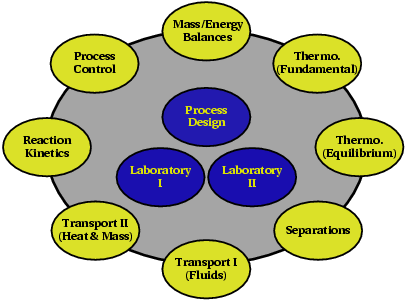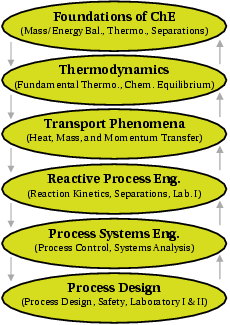In general, the goals of the new curriculum are to
- Give the students a strong fundamental foundation by concentrating on the essential core of scientific and engineering basics in a given discipline.
- Enhance systems thinking by helping students to integrate their knowledge across courses and disciplines so that they are better prepared to address open-ended problems.
- Prepare and provide for continuing education and life-long learning.
Specifically, the grant will allow the Department to: - Modularize and integrate the critical "core" of Chemical Engineering (including mass balances, thermodynamics, kinetics, separations, transport phenomena, process systems, control, laboratory, and design) into six Pillar courses.
- Re-evaluate and re-align supporting courses (mathematics, chemistry, physics, and biology) and elective courses into application-focused tracks.
- Re-align each individual course so that, in addition to the traditional macroscopic and continuum-level descriptions, we also include "sub-continuum", molecular or "fundamental unit" analysis.

The shift in curriculum is from short, (primarily) disconnected courses with little "integrated" insight until late in the curriculum, to a more thoroughly integrated curriculum involving longer classes which take advantage of Block Scheduling.
New Chemical and Petroleum Engineering curriculum
Block Scheduling calls for courses with considerably longer contact hours than a traditional University course so that: (1) students may gain systems insight through integration of their core knowledge;(2) the instructors have the time to include truly multi-scale descriptions of Chemical Engineering content; and (3) the instructors have the flexibility to accommodate diverse learning styles and incorporate active learning more effectively.
For more details and supporting literature regarding Block Scheduling please see:
- R.L. Canady and M.D. Rettig. Block Scheduling: A Catalyst for Change in High Schools. Eye on Education, Inc., Priceton, New Jersey, 1995.
- J. Carroll. Organizing time to support learning. The School Administrator, 51:26-33, 1994.
- In R.L. Canady and M.D. Rettig, editors, Teaching in the Block: Strategies for Engaging Active Learners. Eye on Education, Inc., Priceton, New Jersey, 1996.
